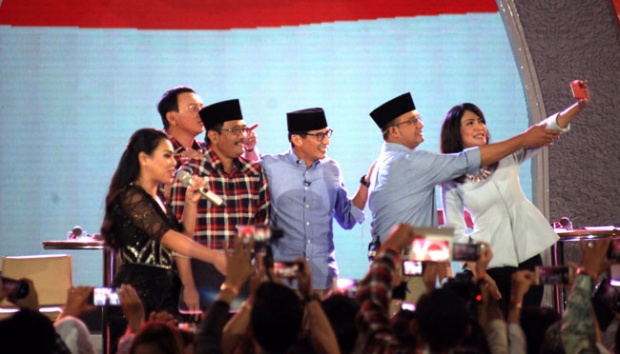
TEMPO.CO, Jakarta- The commotion over the Jakarta gubernatorial election in the last six months has been both a relief and a concern. It was a relief because the fuss and chaos of the campaign did not end in violence or disturbances that sparked rioting. To that extent, democracy in Jakarta deserves praise. Conversely, the election was worrying because misplaced religious jargon was used to win over voters.
It all began with a speech by incumbent governor Basuki Tjahaja Purnama (aka Ahok) at the Thousand Islands district last September. In a discussion with local residents over a fish cultivation program, he quoted a Koranic verse and criticized puritans who used religious sentiments to attack political opponents. This magazine has repeatedly stated that Ahok’s speech was not blasphemous. But we must admit that his statement was like kindling among dry leaves.
Large scale demonstrations demanding Ahok be tried in court developed into calls for Islamic shariah law and the replacement of the national ideology. The protestors seem to have forgotten that the founding fathers agreed on the Pancasila principle as the basis for the nation, because they were aware that Indonesia was a culturally and ethnically diverse country.
Undeniably, Agus Harimurti Yudhoyono and Anies Baswedan, the first named being eliminated in the first round, benefited from this polarization. Their electability rose sharply after the Thousand Islands incident. The alliance they built with Islamic religious scholars and politicians underlined what Ahok lacked: Islam and Islamic symbols. Instead of criticizing Ahok’s development model, which was seen as not favoring the less wealthy, the two men beat the drum of politicized religion.
On the other hand, one viewpoint that Ahok was looking for an electoral advantage from the Thousand Islands incident cannot be completely ignored. Because of this speech, and the massive opposition from conservative Muslims that followed, Ahok gained sympathy from moderates and nonMuslims. The segregation was apparent: Agus and Anies were supported by conservative Muslims, while Ahok was supported by moderate Muslims, nonMuslims and the ethnic Chinese community.
This led to chaos. A war of words, posters and banners broke out in social media and on the streets. Hoaxes spread. After the election first round, when calls spread for prayers not to be said over the bodies of Muslims who had supported Ahok, his supporters responded by promoting a spirit of antisectarianism. Anies, who initially seemed to allow these calls to spread-perhaps in order to increase his vote-subsequently denied the ban on prayers came from his camp, especially when public resentment over the calls peaked.
Now in the second round, the two candidates seek the support of the people who voted for Agus and those who did not vote in the first round. With such a small gap between them, according to polls, they are pursuing Muslim voters-the group they are convinced will decide the outcome.
Likea man at his wit's end, Ahok is also using Islamic symbolism, through Djarot Saiful Hidayat, his running mate. While retaining the votes of moderates, Ahok and Djarot have surrendered to the temptation of going after votes from conservative Muslims.
Like the Anies-Sandi ticket, on the ballot paper for the second round, Djarot will be wearing the black traditional peci hat-which is often mistaken as a sign of piety. In campaign activities, voters are being urged to vote for Djarot because he already has made the Haj pilgrimage, while Anies Baswedan has not. The contest over policies and programs has been overshadowed by the clamor of promises wrapped in religious sentiment. Pessimists feel certain that this religious polarization will not end with this election. Whoever wins will realize that religious issues took them to the top. The minority and the majority will both portray themselves as victims.
This bleak state of affairs has come about because the Jakarta gubernatorial election is seen as the first step on the road to the 2019 presidential election. In other words, politicization of religion will not stop once the Jakarta gubernatorial polls close.
The winner of this election must realize he will not be able to implement his programs if society is divided. Politicization of religion must stop. The public must be taught to think rationally when assessing candidates to be their governor or head of state. Indonesia must not fall victim to politicization of religion in any form. (*)
Read the full story in this week's edition of Tempo English Magazine























